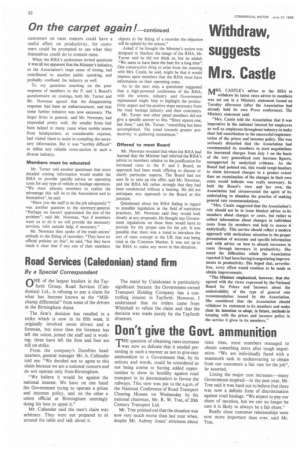On the carpet again I
Page 34

If you've noticed an error in this article please click here to report it so we can fix it.
customers on rates matters could have a useful effect on productivity, for customers could be prompted to see what they themselves could do to contain rates.
When the RHA's spokesmen invited questions it was all too apparent that the Minister's initiative, or the Association's inept sense of timing, had contributed to another public spanking, and probably confused the industry as well.
To my questions touching on the poor response of members to the P. and I. Board's questionnaire on costings, both Mr. Turner and Mr. Newman agreed that the disappointing response had been an embarrassment, and that some further initiative was now necessary. The larger firms in general, said Mr. Newman, had responded pretty well; the smaller firms had been helped in many cases when mobile teams from headquarters. at considerable expense, had visited them to assist in compiling the necessary information. But it was "terribly difficult" to define any reliable cross-section in such a diverse industry.
Members must be educated Mr. Turner told another questioner that more detailed costing information would enable the RHA to provide specific advice on operating costs for any type of vehicle or haulage operation. "We must educate members to realize the advantage this will be to the Association and to themselves", he said.
"Have you the staff to do the job adequately"? was another question to the secretary-general. "Perhaps we haven't appreciated the size of the problem", said Mr. Newman, "but if members want us to do it we will provide the necessary services, with outside help, if necessary."
Mr. Newman then spoke of the trade unions' attitude to the fitting of recorders. "They have no official policies on this", he said, "but they have made it clear that if any one of their members objects to the fitting of a recorder the objection will be upheld by the unions."
Asked if he thought the Minister's action was designed to blacken the image of the RHA, Mr. Turner said he did not think so, but he added: "We seem to have been the butt for a long time". One constructive thing to arise from the meeting with Mrs. Castle, he said, might be that it would impress upon members that the RHA must have information on their operating costs.
As to the next step, a questioner suggested that a high-powered conference of the RHA, with the unions, industry and Government represented might help to highlight the productivity aspect and the positive steps necessary from the road haulage industry and their customers.
Mr. Turner and other panel members did not give a specific answer to this. "Since square one, last June," said Mr. Turner, "something has been accomplished. The trend towards greater productivity is gathering momentum."
Offered to meet Board
Mr. Newman revealed that when the RHA had learned that the Minister had referred the RHA's advice to members relative to the justification for increased rates to the P. and I. Board, an approach had been made offering to discuss or clarify particular aspects. The Board had not seen fit to take up this offer, said Mr. Newman, and the RHA felt rather strongly that they had been condemned without a hearing. He did not anticipate any approach to the Board at this juncture.
Questioned about the RHA feeling in regard to possible legislation in the field of restrictive practices, Mr. Newman said they would look closely at any proposals. He thought any Government regulations on these lines would have to provide for the proper rate for the job. It was possible that there was a trend to introduce the sort of rates concept in the UK that was being tried in the Common Market. It was not up to the RHA to make any move in this direction.
























































































































